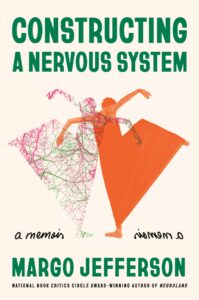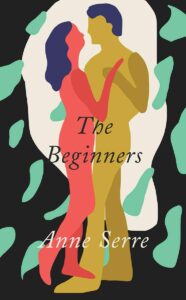
This week’s illuminating literary criticism includes Michele Filgate on Samantha Hunt’s The Unwritten Book, Joyce Maynard on Delia Ephron’s Left on Tenth, Lake Micah on Margo Jefferson’s Constructing a Nervous System, Robert F. Worth on Cathy Scott-Clark and Adrian Levy’s The Forever Prisoner, and Lucie Elven on the work of Anne Serre.
*
“The living search for signs — for answers — just as we do when we read books. This search forms the backbone of The Unwritten Book, Samantha Hunt’s first work of nonfiction, which contains a book within a book — chapters of an unpublished novel written by her late father about a secret society of people who can fly without wings … In her expansive and inventive new book, Hunt uses her father’s incomplete manuscript as a vessel to communicate with him 20 years after his death … To attempt to categorize The Unwritten Book is to diminish the effect of reading it. Hunt studied geology, and her fascination with the bedrock of the natural world overlaps with her elemental love of storytelling … Walter’s unfinished book is both a ghost and a springboard. Hunt annotates his chapters with her own thoughts on the opposite page — a daughter in conversation with a father but also a writer speaking with her readers … The Unwritten Book is by turns mesmerizing, philosophical and funny. In one amusing chapter, Hunt visits a medium to ask Charlotte Brontë’s ghost for a blurb for her new book … Hunt believes that if we understood where we came from, we’d be less afraid of returning to the dirt. There’s an encyclopedic exuberance to her approach, a willingness to engage with a subject that is universal but mostly dreaded, and, in doing so, to make connections we might otherwise miss.”
–Michele Filgate on Samantha Hunt’s The Unwritten Book (Los Angeles Times)
“Delia Ephron is also a chronicler of her life, but one less inclined to focus on the dark side — even when the story is a tough one, as hers initially appears. A lifelong writer of screenplays, essays, novels (blessed and cursed to have followed on the heels of her sister Nora Ephron, with whom she collaborated on the quintessential ’90s romantic comedy You’ve Got Mail), Delia found the source material for her new work from the worst possible series of losses … In between these events, something extraordinary happened. An article she’d written that appeared in The New York Times on her difficulties getting her late husband’s landline disconnected inspired a letter from a Jungian psychotherapist in Marin County, Calif., to whom she’d been introduced, at age 18, by her late sister … He and Delia fell madly in love. How could any writer, having lived this story, resist the urge to turn it into a memoir? … I read with a stab of recognition Delia Ephron’s descriptions of the early days after her husband’s death. She preserves his message on their answering service, her only record of his voice … But Left on Tenth — though it opens with Jerry’s death — is less the story of a woman losing a husband than it is that of a woman falling in love again at age 72 … Ephron presents a moving and heartfelt portrait of romance — also of passion … But let’s not forget, Delia Ephron is part of the team who created You’ve Got Mail. If there’s such a thing as a feel-good memoir, this is it.”
–Joyce Maynard on Delia Ephron’s Left on Tenth (The New York Times Book Review)

“The vintage and revenge of memory, its random lurch and rough stroke: this is her great theme, Margo Jefferson … Her project, initiated with the diary Negroland (2015) and extended just now with Constructing a Nervous System, is to effect an inspection of a personal history that has become gloomed, stark: gothic, nearly … Her narration is solipsistic, almost—at once self-conscious and self-regarding. With the remit of anything that suits her fancy, she bears ideas not to their conclusion or completion but until she’s done with them. Cogitations flare fulgently upon the page . . . and are turned away from with the boredom, exasperation, ennui, and melodrama of whim … Now the arcade of memory is collapsed into one huge heap. Jefferson refuses chronology, neglects to date her reminiscences. The mode is memoir, but equally is it intellectual history, providing the genealogy of a sensibility passed down like a gene, or a gene disorder, and then spliced into another … Jefferson’s policy is one of radical imagination into and out of their predicaments, those beau ideals, their situations of alluring and historical specialty … Her intrepid self-stylings are traced and tracked, now with anxiety, now with sardonic authority, and finally with perhaps inevitable Du Boisian double consciousness … This makes for a different Margo Jefferson than that in Negroland, whose controlling schema was to pare, whittle, reduce, never intromit—in strenuous accordance with the stipulations of her black haut bourgeois milieu … Heed the belletrism of the prose, the mandarin delectation of a major writer in her late style … What else for Margo Jefferson to do but to mark the warp and weft of her world, her cosmogony of attitudes and of affects, writing for us a new form of Künstlerroman.”
–Lake Micah on Margo Jefferson’s Constructing a Nervous System (4Columns)
“Abu Zubaydah is often cited in the vast library of books written about the 9/11 attacks and their legacy, from self-justifying C.I.A. memoirs to angry critiques of the Bush administration. Yet he remains a mysterious figure, because — amazingly — he is still being held incommunicado, in deference to a promise made by the Bush administration to the C.I.A. in 2002 … The Forever Prisoner is a comprehensive and at times excruciatingly detailed narrative about Abu Zubaydah and the people who ordered and oversaw his interrogation. The authors managed the extraordinary feat of communicating with him through a ‘circuitous route’ … They also spoke at length with the military psychologists who tried on Abu Zubaydah the C.I.A.’s ‘enhanced interrogation techniques’ — a revolting euphemism for beatings, sleep deprivation, near-drownings and other forms of torture … Cathy Scott-Clark and Adrian Levy — who have published several previous books on similar themes — interweave the stories of captive and interrogator, showing how fatally unprepared they were to understand each other. It wasn’t just that most of what the Americans knew about Abu Zubaydah was wrong … impressively thorough … The book’s most powerful and original passages are about Abu Zubaydah himself.”
–Robert F. Worth on Cathy Scott-Clark and Adrian Levy’s The Forever Prisoner (The New York Times Book Review)

“Her first book, The Governesses, published in France in 1992, began as a short story.* Even now it comes to little more than a hundred pages. Three governesses, ‘mistresses of games and pleasures’, are employed to entertain the four young sons of the Austeur family. Although they have individual names (Eléonore, Laura and Inès), the governesses work as one … the governesses’ pursuit of excitement is what animates the household … This zigzag pattern of events, which Italo Calvino identified as a feature of folktales, creates ‘incessant motion’ within a restricted space. Play is more real here than reality … Everything is in a state of terminal undoing … There is no moral in the ending – Serre has jettisoned that element from the folktale genre. Like Leonora Carrington, she does not mimic life, but has an interest in stories as machines with their own life on the page … Serre’s subsequent work received a hushed reception in France. Though she has said they were only ever intended as exercises, or musical scales, her early stories, collected in Un voyage en ballon in 1993, are helpful guides to her work, which is often described as ‘fabulist’: not because they contain animal allegories but because of Serre’s stylistic habits … But, even in these early stories, there is more going on than the word ‘fable’ would suggest … Serre is posing a question about what is essential to a story and to a life, and what remains if one element (geography, for example) is subtracted, then another … Putting down one of Serre’s books is like coming up for air. The theorist André Belleau argues that, unlike novels, short stories collapse time in the service of a singular event; Serre’s stories of all lengths do this.”
–Lucie Elven on Anne Serre’s The Beginners and The Fool and Other Moral Tales (London Review of Books)

